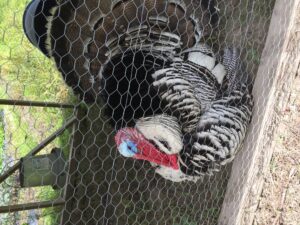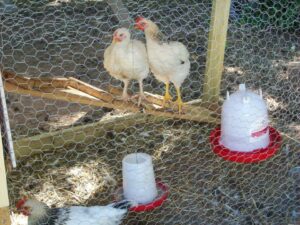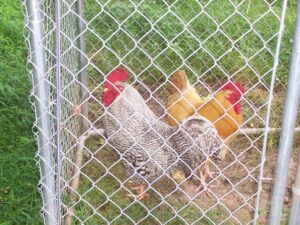Avian Influenza What Hobbyists Need to Know
go.ncsu.edu/readext?848846
en Español / em Português
El inglés es el idioma de control de esta página. En la medida en que haya algún conflicto entre la traducción al inglés y la traducción, el inglés prevalece.
Al hacer clic en el enlace de traducción se activa un servicio de traducción gratuito para convertir la página al español. Al igual que con cualquier traducción por Internet, la conversión no es sensible al contexto y puede que no traduzca el texto en su significado original. NC State Extension no garantiza la exactitud del texto traducido. Por favor, tenga en cuenta que algunas aplicaciones y/o servicios pueden no funcionar como se espera cuando se traducen.
Português
Inglês é o idioma de controle desta página. Na medida que haja algum conflito entre o texto original em Inglês e a tradução, o Inglês prevalece.
Ao clicar no link de tradução, um serviço gratuito de tradução será ativado para converter a página para o Português. Como em qualquer tradução pela internet, a conversão não é sensivel ao contexto e pode não ocorrer a tradução para o significado orginal. O serviço de Extensão da Carolina do Norte (NC State Extension) não garante a exatidão do texto traduzido. Por favor, observe que algumas funções ou serviços podem não funcionar como esperado após a tradução.
English
English is the controlling language of this page. To the extent there is any conflict between the English text and the translation, English controls.
Clicking on the translation link activates a free translation service to convert the page to Spanish. As with any Internet translation, the conversion is not context-sensitive and may not translate the text to its original meaning. NC State Extension does not guarantee the accuracy of the translated text. Please note that some applications and/or services may not function as expected when translated.
Collapse ▲Home gardeners and backyard songbird enthusiasts have likely heard that Avian Influenza (AI) has been detected in some migrating waterfowl in North Carolina. It is important to note that this poses a threat to both hobbyists keeping backyard flocks and poultry farms. In my position as a County Agent, I want to educate home bird feeding enthusiasts and backyard poultry hobbyists as to the importance of this bird disease.
Home gardeners should know how AI affects their casual bird feeding. If they have a backyard poultry flock hobby farmers should know how AI could affect their chickens, turkeys, ducks, geese or other poultry. So, I have put together a brief list of things that an average home gardener or backyard flock enthusiast should know.
- Avian influenza (AI) doesn’t generally kill native birds nor does it even cause any symptoms in most infected wild birds. AI is deadly in chickens and other poultry.
- AI is occasionally found in wild waterfowl such as ducks and geese. These birds are usually asymptomatic.
- AI has been detected in migrating birds in several east coast states including North Carolina in 2022.
- AI is generally not a concern for songbirds at bird feeders but is a concern for backyard flocks of chickens, ducks, geese or turkeys.
- It is the recommendation of the NC Department of Agriculture to keep backyard flocks in an enclosed area until further notice. People with backyard flocks should keep their flocks penned and make sure the birds cannot come into contact with wild waterfowl. It is recommended that pens, coops and runs be covered with a roof such as sheet plastic so migrating waterfowl droppings won’t come into contact with backyard flocks. This is especially true if hobby flocks are kept near ponds, streams or rivers where migrating waterfowl congregate.
- Poultry that are used to being free-range will need distractions in their pens such as food scraps so they do not get bored and start pecking each other.
- It is extremely rare for AI to jump to humans and is not really a concern for human health.
- The real danger AI poses is to the poultry industry which is a billion dollar industry in the state and multi billion dollar industry in the southeast. As you can imagine, there is a keen interest in protecting this vital food source.
- For the time being, I will be instructing those who ask me if they should remove their bird feeders at home to leave their bird feeders up if they do not have a backyard poultry flock. If they do have a backyard poultry flock it would be a good idea to take down the bird feeder or at least move it far away from the poultry.







